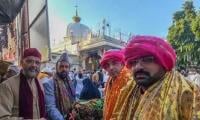Hatred has been a feature of human history. We have seen it again and again, illogical in its dimensions, difficult to understand, hard to live with.
In India, as Prime Minister Imran Khan has tweeted in a series of messages, it strongly resembles the kind of pogroms seen in Nazi Germany. Imran, tolerant as far as bias based around religion or nationality goes, has been strong in his condemnation of the events unfolding almost uncannily on the streets of New Delhi, a city that has for centuries known mainly peace.
The prime minister’s fears that they could be attempts to replicate the violence against minorities in our own country as a kind of frenzied revenge are not unfounded and he has done well to warn against it strongly and without mincing words. In the past, we have seen, based on a completely illogical chain of thought, Christians being attacked after US attacks on Muslim countries.
What we have seen in New Delhi over the past days is just as illogical. The attacks launched by those in favour of the Indian Citizenship (Amendment) Act on those opposing it have been horrific. Under this Act, fast-track citizenship would be granted to all those seeking it from countries neighbouring India except for Muslims. The proposed law being pushed forward by the BJP government and Prime Minister Narendra Modi who had last year ended the special status of Kashmir and split it into two union territories as well as imposed a lockdown which remains in place, essentially ends the foundations of the secular India on which the nation was built. There is no longer a ‘Shining India’; only a blood-stained, tattered one where Hindus attack Muslims and Muslims flee for safety in scenes that we have seen in Rwanda, in Nigeria, in the Europe of the past, in Israel and in other places. It is tragic that this should happen in the world’s largest democracy, where Muslims as the largest minority make up just under 15 percent of the nation’s 1.3 billion people. Would the same scenes have been witnessed if the fires of hatred first lit in a deliberate act by the British to weaken India as it began its early struggle for independence that culminated in the creation of the new country of Pakistan in 1947 not taken place? It is impossible to say.
But certainly it seems almost unbelievable to hear of the integrated communities of Muslims and Sikhs who lived in many of our mountain regions and of a Punjab that was shared almost equally between Muslims and non-Muslims. How many prevail for the most part across it? It did too among Muslims and Hindus in Tharpakar, until very recently when groups of Muslim extremists began a drive against Hindus focused on the forcible conversion of young girls, their marriage to Muslim men and also the kidnapping of Hindu businessmen. The fact that the old tradition, where the Sikhs of Peshawar laid out iftari on the streets for their Muslim brethren each Ramazan, has had to be ended for fear of communal violence is an example of how humanity can fade away and be replaced by something resembling insanity.
We have seen this insanity before in India. This is the first time however that so many have died since the death of around 1,000 people, almost all of them Muslims, in Gujarat in 2000. That violence was triggered by Narendra Modi, who was then heading that state. At least 45 people are now dead in New Delhi and there is every possibility the toll will be added to.
It is worth remembering, however, those who have refused to succumb to the wave of madness. Hindus have protected Muslim neighbours, putting their own lives at risk; Sikhs have offered shelter in all the gurdwaras of Delhi. The same has happened in Pakistan, where Muslim families helped protect minorities in specific cases, such as that of Rimsha Masih in 2012, when the teenage girl believed to be suffering from mental instability was accused of blasphemy by a local preacher. The charge was later proved to be completely unfounded. Like others before her, and after her, Rimsha had to flee overseas.
What provokes hatred? What makes humans develop feelings so strong that they are willing to kill other men or women simply on the basis of their faith, their colour or their ethnicity? Psychologists and political analysts have tried to find answers for a very long time. It is not easy to say. Some experiments have shown that when a precedent is set by a few people who spur on a mob, the mob will follow without thinking.
The herd mentality of man is well known. In the case of India, the BJP has led the herd. The manner in which it has followed is however frightening. Somewhere deep down within man there lies a bud of hatred which it seems cannot be completely covered by education, by the pretence of civilized behaviour or by life in a multicultural setting.
Neuroscientists and psychologists need to understand better where this bud springs from. Is it a part of nurture? Is it passed down generations, perhaps in subtle form as a result of teaching by parents, grandparents, teachers, others? But it undoubtedly exists. We see neo-Nazis act in Europe against those of a different race, a different belief – those who are not white or not white enough. We see it in our own country taking on many multiple and dangerous dimensions.
We continue to see it in the US. Over five decades after the black civil rights movement and laws which granted people of colour equal status at least within the constitution they do not have equality in real life. In education, they are discriminated against, relegated to the worst schools often as a consequence of their socio-economic status and the place where they live. There is strong discrimination in terms of employment and there have been cases where in emergency rooms white patients have refused to be treated by black nurses. In other cases, it is anti-Semitism in the US that is very prominent.
In today’s world, where we talk of setting up a colony on Mars, we have not yet overcome the hatred within us. Surely this is a more important task than establishing stations beyond Earth. The focus of human endeavour is possibly misdirected. Until we are able to wipe out hatred at least in its most open forms, at the very least in a form where it takes lives as a result of riots and mob attacks and arson that suddenly breaks out, we cannot say we have achieved anything at all. We are still basically Neanderthals. The progress beyond that primitive stage of human development has not come.
The writer is a freelance columnist and former newspaper editor.
Email: kamilahyat@hotmail.com
Prolonged slowdown erodes credibility of Pakistan’s IT sector on the global stage
Role of UN in peacekeeping must also be strengthened to ensure stability in region
America’s economic and technological prowess is rooted in its willingness to embrace risk, foster innovation, and...
Contributions of countless other women go unnoticed and unacknowledged year after year
Joyous gatherings, poetic expressions, and cultural rituals that revolved around water are now echoes of distant past
Most lawyers expect massive backlash within Supreme Court, reaction was far more muted than anticipated







